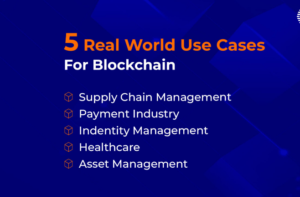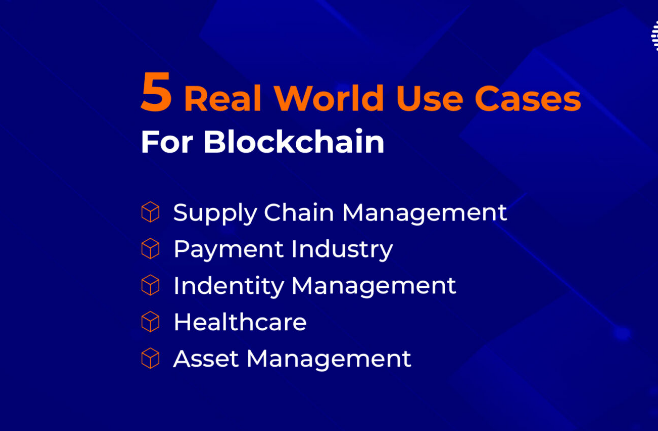Blockchain in Action: Essential Real-World Use Cases Explained
Blockchain technology empowers so many aspects of industries that guarantee security and full transparency in them. Thousands of companies already use blockchain to better efficiency, security, or simplify their processes. From finance to supply chains, its real-world applications never stop showing the power of this innovative technology.
These use cases help in the understanding of people as to why blockchain matters today. Anyone who is concerned with technology, business, or investment should be able to understand how important this system is in restructuring many sectors right now.
This marks the beginning of some of the practical uses of blockchain-a scale of growth and realistic impact. We are going to take a deeper look further into the key examples of effective blockchain usage currently happening in the world.
Key Takeaways
- Blockchain is making life easier and more secure across industries.
- Understanding blockchain helps in capturing the importance of this in modern technologies.
- Real-life use cases show the potential of blockchain for future growth.
How Blockchain Technology Works
Blockchain technology offers a secure and transparent way to store information and verify it. It does so through allowing data to be written in a manner such that its alteration becomes highly improbable. This section, therefore, takes a look at its origin, how it works, and some important features.
Origin of Blockchain
Blockchain was invented in the year 2008 by a person or group under the name Satoshi Nakamoto. It was developed as a basic technology for Bitcoin, the first cryptocurrency. The concept of blockchain emerged when there was a need for another type of currency, which did not depend on banks.
As Bitcoin became more famous, so did other uses for blockchain. It started being seen as a solution that ranged from industries like finance and healthcare to supply chain management; from being only a tool for cryptocurrencies, it has evolved into a multi-tool for many applications aside from just digital currencies.
How Blockchain Works
Basically, blockchain is just an electronic ledger of transactions that are maintained on hundreds of computers. This ledger consists of blocks with sets of data in them. Each block is connected to the previous block, therefore creating a chain. Such a prospect helps all the information be linked and recorded securely.
When any new transaction is done, it gets verified by performing complex algorithms of a network of computers called nodes. After verification, that new transaction gets added to a new block. When the block gets filled, it gets appended to the chain. All this gives a large amount of security and transparency to blockchain.
Key Features of Blockchain Technology
Blockchain technology has a number of key features, including the following:
- Decentralized: While traditional databases operate on and rely upon the discretion of a central authority, blockchains are distributed among hundreds of computers. This reduces the risk of one point of failure.
- Transparency: The participants of the network can see all the transactions recorded in it. It thus creates a sense of trust amongst its users.
- Immutability: Once the information is added to the blockchain, it cannot be changed or deleted.
- Security: Blockchain ensures that data is secure through cryptographic algorithms. This blocks unauthorized access, tampering .
The following features make blockchain a strong implementer in applications that impose advantages on security, trust, and efficiency.
Implementation and Adoption of Blockchain
As this technology emerges, so does its use in many sectors to add in efficiency and security. The main areas of implementation so far are financial, supply chain, identity verification, and smart contracts. Each of them illustrates how blockchain can bring about change and innovation.
Innovation in Financial Services
The use of blockchain technology is going to reinvent the financial services because it makes the process of financial transactions a lot quicker and more affordable. Traditional banking usually involves a lot of intermediaries who add time and fees. In this case, blockchain allows for transactions to occur directly between parties.
Cryptocurrencies are some of the popular examples that allow people to send money around the world without the need for banks. The same technology provides support for decentralized finance applications that allow for various financial services, including lending and trading, on blockchain platforms.
Many of these are studying blockchain as an enabler of services like cross-border payments and transaction settlements. This enhancement results in increased transparency with lower fraud and hence benefits the customers.
Supply Chain Transparency
Supply chains entail the complex process of creation and delivery. Blockchain enhances the transparency and traceability of this complex process. Every transaction can be recorded on public ledgers and will therefore enable real-time information to be viewed by stakeholders.
For example, it enables the companies to track the origin of products for quality purposes. Through blockchain, they can ascertain that indeed the goods are from sustainable origins.
The technology is also helpful in recalling scenarios as it enables the businesses to identify the impacted products with speed. Other firms like Walmart and IBM are using the technology to improve their supply chains in aspects of efficiency and customer trust.
Identity Verification Solutions
Identity verification is something quite vital in the sense of building security and trust in many industries. Blockchain presents a secure manner of managing identity. It gives users the control to share data only with entities they believe are necessary.
Blockchain-based digital identity solutions have securely locked personal information. This kind of approach lessens the incidents of data breaches, which have been common in old approaches.
Also, the individual need not prove his identity again and again by providing personal information. Banks, healthcare systems, and government organizations are also moving to adapt this technology to enhance not only security but to speed up various processes, too.
How Smart Contracts Work
It works in a way that smart contracts eliminate the need for intermediaries, as agreements will happen automatically without any party’s interference. Smart contracts are actually self-executing contracts whereby the terms of an agreement or contract are written directly into lines of code. When specific conditions are met, the contract is then self-executed to implement the agreement.
This can reduce the amount of time and fees that come associated with traditional contracts. Many businesses use smart contracts to automate some business processes related to industries such as real estate and insurance.
For instance, smart contracts in real estate can let the transfer of a piece of property take place sans mountains of paperwork. In fact, such innovative solutions do provide ways for even more secure and quick transactions to happen, hence benefitting buyers and sellers alike.
Many companies are embracing the technology of smart contracts in order to provide full transparency and eradicate most risks within their operations.

Also Read :
- Understanding Blockchain: A Beginner’s Guide to Distributed Ledgers
- The Future of Blockchain: Beyond Cryptocurrencies
- How Blockchain Is Revolutionizing Data Security and Transparency
- How Blockchain Is Disrupting Traditional Banking Systems
- The Role of Blockchain Technology in South Africa’s Fintech Industry
